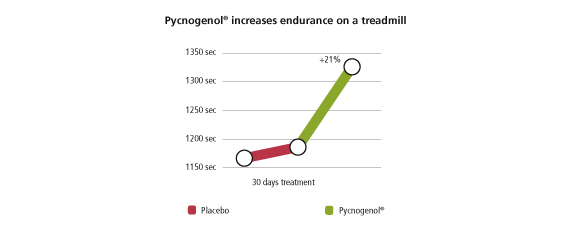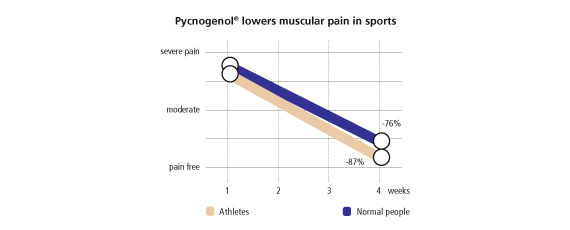Sports

Sports

Data source : 10 Facts on Physical Activity – November 2010 – WHO
Physical exercise goes along with a dramatically increased oxidation of nutrients to meet the shooting up energy demand. Numerous physiological systems and many biochemical interactions are taking place during exercise. Yet, the most significant and performance limiting interplay is taking place between the cardio-respiratory system and skeletal muscle. This is obvious already from the typical 10- to 20-fold increase in inhaled oxygen over rest.
Physical exercise is important to overall health and at the same time increases our body’s need for oxygen. Research indicates Pycnogenol® may play an important role with physical activity because it was shown to aid the body in producing nitric oxide (NO), thus enhancing blood microcirculation and improving blood flow to the muscles. This helps the body achieve peak muscle performance and speeds recovery after exercise, which may result in reduction of muscular aches in both athletes and healthy individuals.
Pycnogenol® stimulates the enzyme “endothelial nitric oxide synthase” (eNOS) for enhanced generation of NO from the precursor molecule L-arginine.
The link between Pycnogenol® and sports endurance was first studied several years ago at California State University. Recreational athletes showed an increase of athlete endurance while supplementing with Pycnogenol® as compared to endurance recorded from participants taking the placebo.
In a double-blind, placebo-controlled, crossover study design, recreational athletes were supplemented with either Pycnogenol® or placebo for 30 days and were then crossed over to the other group for an additional 30 days. The athletes performed under controlled conditions on a treadmill with individual settings adjusted to 85% of a person’s maximum oxygen consumption to prevent too rapid exhaustion and reduce anaerobic metabolism. Results of the study showed a statistically significant increase of athlete endurance while taking Pycnogenol® as compared to endurance recorded from participants taking the placebo.

An increase in physical activity can lend itself to sore muscles and fatigue which can take several days to subside.
Pycnogenol® was shown to significantly reduce muscular pain and cramps in athletes and healthy, normal individuals. Poor circulation in the muscle is known to cause cramps and the antioxidant improved the cramping in patients due to a stimulation of blood flow to their muscle tissue.
The findings indicate that Pycnogenol® can play an important role in sports by improving blood flow to the muscles and hastening post-exercise recovery. This is great news to the millions of athletes worldwide and extremely significant for all individuals interested in muscle cramp and pain relief with a natural approach.

Two clinical studies have shown that Pycnogenol® causes vasodilatation and consequently improves blood micro-circulation. An increased presence of oxygen and decreased carbon dioxide after consumption of Pycnogenol® was shown. Pycnogenol® contributes to better blood flow and oxygenation of muscle.